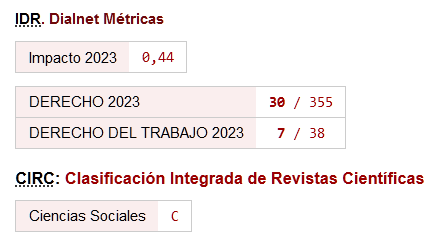Legislator and collective bargaining "substitution effect" in the application of the principle of proportionality by the ECJ
Keywords:
Proportionality principle, fundamental social rights, trade barriers, collective bargaining, market freedomsAbstract
The article analyzes the empirical foundations of the principle of necessity developed by the ECJ, when assimilating labour standards to intra-Community regulatory barriers. The author puts into question the legitimacy and capacity of the Court to substitute both legislator and social partners in the exercise of their collective autonomy. Criticism to the application of the principle of proportionality delves into this area of Law, as it is difficult to objectively determine the level of effectiveness of socioeconomic policies in achieving their mediate purposes, altogether with an assessment of the burden they impose on market freedoms. These strict limits to the exercise of state power regulation contrast sharply with the lax discretion that national jurisdiction provides the legislator, as far as compliance with standards international human rights is concerned.
Downloads
Downloads
Published
How to Cite
Issue
Section
License
-
Atribución — Usted debe dar crédito de manera adecuada, brindar un enlace a la licencia, e indicar si se han realizado cambios. Puede hacerlo en cualquier forma razonable, pero no de forma tal que sugiera que usted o su uso tienen el apoyo de la licenciante.
-
NoComercial — Usted no puede hacer uso del material con propósitos comerciales.
-
CompartirIgual — Si remezcla, transforma o crea a partir del material, deberá difundir sus contribuciones bajo la misma licencia que el original.



 @Lex Social
@Lex Social Linkedin
Linkedin @lexrevista.bsky.social
@lexrevista.bsky.social


